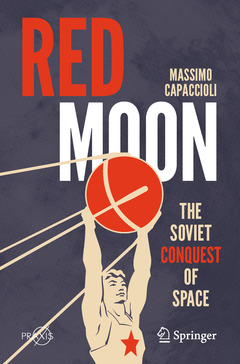Description
Red Moon, 1st ed. 2024
The Soviet Conquest of Space
Popular Astronomy Series
Author: Capaccioli Massimo
Language: English
Subjects for Red Moon:
Keywords
Space Flights; Cold War; Soviet Astronautics; Moon Conquest; Gagarin; Korolev; von Braun; Rockets; Apollo Missions
156 p. · 15.5x23.5 cm · Paperback
Description
/li>Contents
/li>Biography
/li>Comment
/li>
The book is about the ?space race?, starting from the earliest steps of astronautics to the Moon landings of Armstrong and Aldrin. The conquest of space began as a by-product of an exquisitely military project, the rapid, and efficient delivery of explosives, conventional and then nuclear, over great distances into enemy territory. It happened at the turn of World War II, first with the V2s, the Wunderwaffen that von Braun had created for his Führer, and, after the surrender of Germany and Japan, with the intercontinental ballistic missiles that the Russians and Americans built to serve as cabs for atomic bombs. Restrained by the fear of nuclear holocaust, the two great powers that had momentarily divided the government of the world turned the risky muscular confrontation into an unusual race to climb the sky: a stage race with a conventional finish line marked by the human landing on the Moon. Under the constant guidance of Sergei Korolev, the mysterious ?chief designer?, the Soviets got off to a surprise start and stayed in the lead until almost the end, with the Sputniks, the orbital flights of Gagarin and Tereshkova, the first spacewalk, and the unmanned soft landings on the Moon and Venus, only to be caught up and overtaken by the Americans at the very edge. An adventure that lasted a total of twelve years, marked by brilliant and courageous men, by astute and far-sighted politicians, by patriotism and ambition, and, as always, regulated by luck, which profoundly affected our world and the design of its future.
Ballad of the Moon Moon.- The Dawn.- An Introverted Genius.- The Nibelung Saga.- The Unnamed.- Dog’s Heart.- The Red Icarus.- Flag of the Soviets, Lead us to Victory.- The Swan Song.- Fly Me to The Moon.
Massimo Capaccioli, the formerly full professor of astronomy at the Universities of Padua and then Naples Federico II, is currently a professor emeritus. A student in Texas of Gérard de Vaucouleurs, he has worked mainly on the dynamics and evolution of stellar systems and observational cosmology, publishing more than 550 scientific papers in international journals and some university textbooks (including The foundations of Celestial Mechanics, Springer 2022, with E. Bannikova). The director of the Capodimonte Astronomical Observatory in Naples from 1993 to 2005, he realized, in synergy with the European Southern Observatory, the VST telescope, specialized for astronomical surveys and operational since 2011 on Cerro Paranal in Chile. He chaired the Italian Astronomical Society for a decade and the National Society of Sciences, Letters and Arts in Naples and has been a member of the Board of Directors of the National Institute of Astrophysics. He has been awarded four honorary degrees in foreign countries. A freelance journalist and a passionate popularizer, he has collaborated with various newspapers and the Italian television and also founded a scientific journal in Arabic. He is the author of several popularization books.
Is a timely story, considering the ongoing efforts to reclaim the Moon
Serves as compelling story that can also be read as a novel
Presents the story from an unusual perspective




